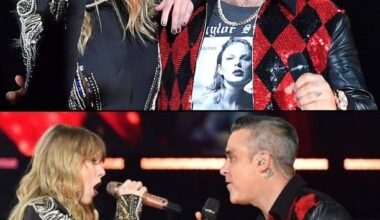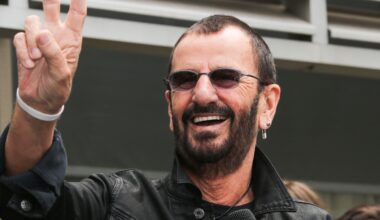From the glamorous Sunset Strip to the gritty tales of rock ‘n’ roll, Motley Crue has always been a band that polarizes opinions. With their loud music, louder lifestyles, and a knack for controversy, it’s no surprise that not everyone in the entertainment world sings their praises. Some stars, including their own former members, have openly expressed their disagreements and disappointments with the band. In this exploration, we dip into the lives and opinions of notable figures who have, for various reasons, found themselves at odds with Motley Crue.
MICK MARS
Mick Mars, the silent yet essential backbone of Motley Crue’s sound, found himself entangled in the band’s drama despite his low-profile persona. As a founding member, Mars contributed significantly to the band’s distinct musical style for over four decades. However, his journey with the Crue hit a snag when health issues forced him to reconsider his touring future. What followed was a publicized departure that seemed to hint at deeper rifts within the band. Mick Mars’ grievances went beyond just parting ways; he felt his legacy was under threat. Despite his critical role, Mars revealed a distant relationship with the other members, one that had been purely transactional for years. His frustration was palpable when discussions around his contribution and the rights to the Motley Crue legacy came into question, leading to a legal battle that laid bare the internal conflicts within the band.
EDDIE VEDDER
Eddie Vedder, the voice of Pearl Jam and a symbol of the grunge movement, represents a stark contrast to the glam rock scene that Motley Crue epitomized. Vedder’s disdain for what he saw as the superficiality and misogyny in Motley Crue’s music was evident. Having personally witnessed the rise of hair metal bands during his time working at a San Diego club, Vedder developed a strong aversion to the genre, Motley Crue included. His criticism wasn’t just about personal taste; it was a reflection of the cultural and musical shift that grunge represented against the excesses of the 80s rock scene. This clash of musical philosophies highlighted a wider debate in rock music about authenticity, substance, and style.
LARS ULRICH
The friction between Lars Ulrich of Metallica and Motley Crue is rooted in a rivalry that dates back to the early days of both bands. Ulrich, known for his outspoken personality, never shied away from poking fun at the Crue, hinting at a competitive tension that existed between the bands. This rivalry wasn’t just about music; it was also about the ethos and image that each band represented. While Metallica dove into the depths of thrash metal, Motley Crue rode the wave of glam rock, each carving out its own niche but also, inevitably, stepping into each other’s orbits. Ulrich’s jabs at the Crue during interviews and public appearances added a personal dimension to this professional rivalry, making it a longstanding point of contention.
SHARON OSBOURNE
Sharon Osbourne, with her keen industry insight and no-nonsense attitude, has had her share of run-ins with Motley Crue. While her interactions were partly influenced by her husband Ozzy’s tours with the band, Sharon’s own observations and experiences led her to form a candid opinion about the Crue’s antics and their impact. She voiced her concerns on various platforms, not just about the band’s behavior but also about their reliance on Ozzy’s fame to bolster their own image. Sharon’s critique wasn’t limited to passing comments; it was an expression of her broader disappointment with certain aspects of the rock scene that Motley Crue seemed to embody.
ROB ZOMBIE
The creative paths of Rob Zombie and Motley Crue crossed on several occasions, leading to a collaborative yet complex relationship. Zombie’s unique blend of horror, rock, and industrial music set him apart in the industry, and his work with Crue drummer Tommy Lee showcased a willingness to bridge different rock subgenres. However, the professional camaraderie took a hit when Motley Crue recruited Zombie’s longtime guitarist, John 5. This move strained the relationship between Zombie and the Crue, revealing the delicate balance of friendships and business in the competitive music landscape. Zombie’s silence on the matter suggests a reserved discontent, underscoring the tensions that can arise when band dynamics and individual careers intersect.
NICOLAS CAGE
Nicolas Cage, a Hollywood star with deep ties to the rock and metal scene, experienced Motley Crue’s live performance alongside his son, revealing a personal connection to the music world. Cage’s diverse acting roles and his outspoken appreciation for various musical genres have made him a prominent figure in both the entertainment and rock worlds. His attendance at a Motley Crue show indicates a level of interest in the band’s music, yet the broader context of his music tastes and experiences places him in a unique position to judge the band’s impact and legacy. Cage represents the crossover appeal of rock music to wider audiences, including those in the film industry, highlighting the cultural reach and influence of bands like Motley Crue.
JOHN CORABI
John Corabi’s stint as the lead vocalist for Motley Crue during the 1990s was a period of both innovation and challenge for the band. Stepping into the shoes of Vince Neil, Corabi faced the daunting task of winning over fans while contributing to a distinct chapter in the band’s history. His tenure, marked by the release of the self-titled album “Motley Crue,” showcased a different musical direction for the band, one that received mixed reactions from fans and critics alike. Corabi’s later reflections on his time with the Crue reveal a complex relationship, marred by professional disagreements and personal disillusionment. His experience highlights the pressures and expectations that come with being part of a high-profile band and the difficulties of navigating change within such a tight-knit and scrutinized group.





